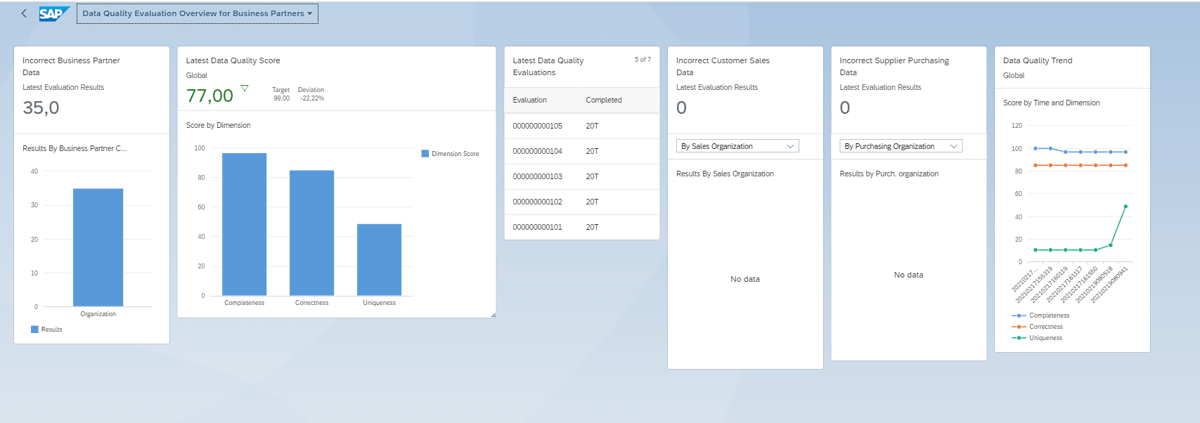Driving digitization, optimizing processes, making better decisions in real time – for these goals, high data quality is of crucial importance. In many areas of a company, data management therefore plays an important strategic role. For example, master data is the basis for supporting processes in heterogeneous system landscapes.
Benefit from a pre-configured system and best practices
Master data reality does not live up to expectations
A general awareness of the importance of high-quality master data is present in companies, as Helge Sanden, editor-in-chief of IT-Onlinemagazin, explained during the panel discussion at IBsolution’s 4th SAP MDG Summit. According to a survey by IT-Onlinemagazin, 80% of companies consider high master data quality to be important, and two-thirds are keen to increase the degree of automation in data maintenance.
In practical implementation, however – as the survey also shows – there are considerable organizational deficits: Only about half of the companies surveyed use approval workflows for changing master data. At 50%, the proportion of companies that validate their master data when it is entered is also relatively low. One third do not have any specifications or guidelines for handling master data. Defined processes for data entry and maintenance are not to be found in around 20% of companies. These figures lead to the conclusion that there is a discrepancy between expectations and reality when it comes to master data management. Accordingly, the question that arises is how to achieve a high level of master data quality.

Companies are aware of the importance of high data quality, but have difficulty ensuring it in practice.
Data governance as a basis
One thing is certain: an up-to-date, high-quality database is not a one-time effort, but an ongoing task. Therefore, it is worthwhile to establish processes for the collection and maintenance of master data in the company. When setting up an appropriate governance strategy, it is important to involve the business departments at an early stage. If they recognize the value of high data quality for their work, they are also more willing to assume responsibility for it as part of a coordinated overall process.
Once companies have established a central master data system, they have a stable foundation on which they can establish and maintain high data quality over the long term. There are now numerous tools available to help companies analyze and cleanse their data. Data models can be improved with the help of validations (which values are allowed?) and derivations (automatic suggestions for filling values). For continuous monitoring of master data quality, the development of a suitable metrics model is recommended. Artificial intelligence can usefully complement data maintenance and plays to its strengths particularly in automated data corrections and in the automatic analysis and suggestion of business rules.
Processes must fit the business
Companies must find a way to optimize and, to a certain extent, automate the entire lifecycle of master data – from creation to modification to archiving. For it to be successful, this path should fit the individual requirements of an organization and the reality of the company. In view of increasingly complex system landscapes, master data integration poses a particular challenge. Data complexity will also continue to increase in perspective, as more and more unstructured data is being generated alongside structured data. Likewise, the Internet of Things and the related collection of sensor data will influence data management in the short to medium term.
Organizing the lifecycle of master data should go hand in hand with the particular corporate or business objective to which the data is to contribute. This determines how data management needs to be designed in order to derive maximum benefit from it. Low data quality leads to inefficient processes and costly delays in operations in many places. Conversely, companies with high data quality are able to reduce expenses and generate greater liquidity.
The best time is now
Those who invest in the quality of their master data today are on the one hand preparing their company for the current challenges of the Corona pandemic and on the other hand are already getting ready for the future SAP S/4HANA transformation. This will run faster and more smoothly if the data quality is right from the start and does not have to be optimized in the course of the migration. In addition, the creation of rules for master data maintenance prevents a loss of know-how when responsible employees leave the company. Corresponding programs analyze the inventory data and find correlations that can be mapped using rules. So there are plenty of reasons to tackle master data management right now.
![IBacademy_Logo_blau[496] IBacademy_Logo_blau[496]](https://www.ibsolution.com/hs-fs/hubfs/IBacademy_Logo_blau%5B496%5D.jpg?width=200&name=IBacademy_Logo_blau%5B496%5D.jpg)




